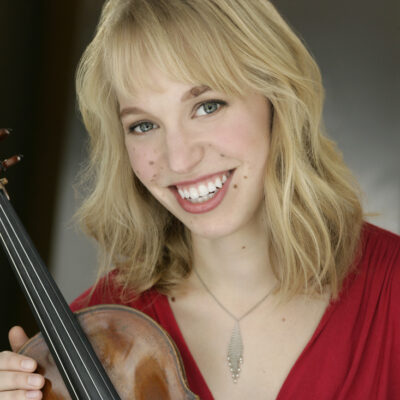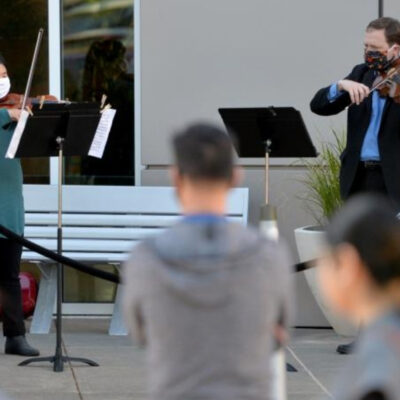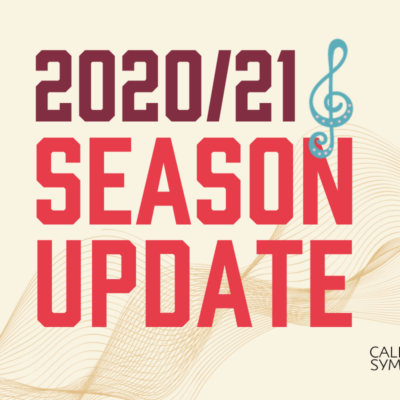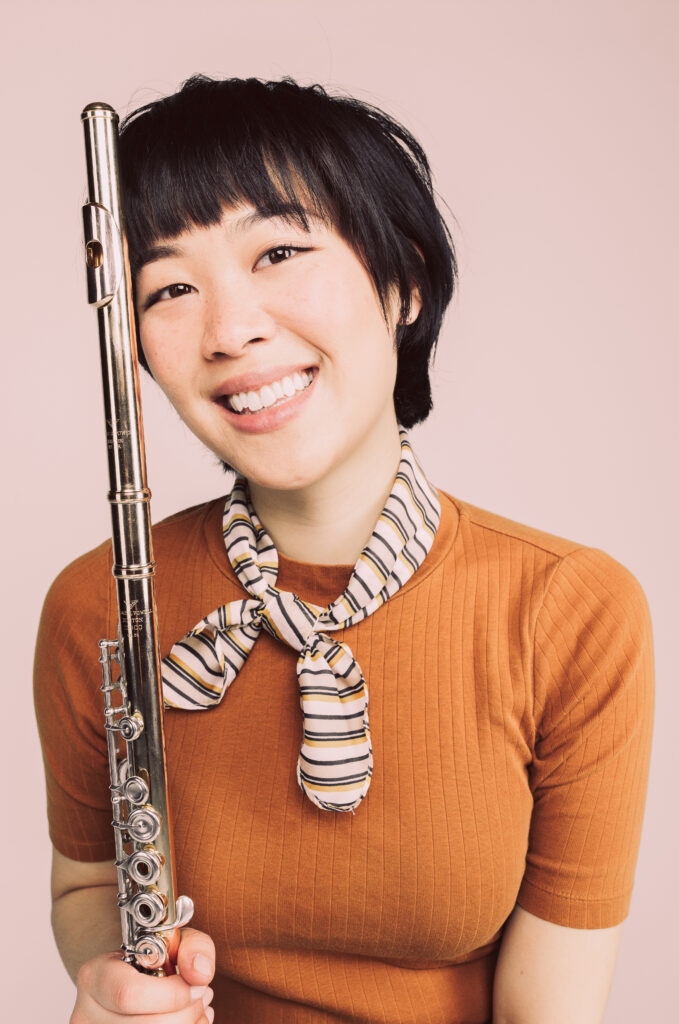
Annie Wu performs Kevin Puts’ lyrical flute concerto—Nov. 16 & 17, 2019, at the Walnut Creek Lesher Center for the Arts
At just 23 years old, she’s a national award-winner, Harvard and New England Conservatory graduate, and a YouTube star. Pleasanton-born flute powerhouse Annie Wu joined us to talk about her California connections, Lizzo, and her wardrobe choice regrets for the flute-beatboxing video she made when she was in high school and which ended up going viral.
Your beatboxing flute video has racked up more than 2m views on YouTube. Did you think when you recorded it at age 15 that it would take off like that?
It still makes me chuckle knowing that a video I recorded in my living room with a tape-based camcorder 8 years ago is still getting views. I don’t think anyone expects their videos to become viral, and I certainly did not think that my little video – posted on my behalf by composer Greg Pattillo – would be seen by more than my friends and family (hence my regrettable decision to wear a sideways cap and shades, which will now apparently follow me to my grave).
That being said, it is also amazing how many interesting opportunities this crazy video has given me. I’ve taken this piece to Vegas (multiple times!) and also been able to play for the Boston Celebrity Series, a TedTalk gathering, and children in schools around the nation. What I love most is how wide kids’ eyes and mouths get when they hear this music, and how open it makes them to whatever other music I show them afterward. One of my favorite stories about this Youtube video is the revelation that the boy living in the dorm room one floor below me my freshman year had my video music as his ringtone for 1 year (thanks, Ben!)
It seems like the flute has been elevated in pop culture recently thanks to high-profile performances by flute-playing singer, rapper and all around music sensation Lizzo. What do you think about her?
Okay, I love Lizzo. I follow Lizzo’s flute on Instagram, and I definitely talk about Lizzo with my coworkers and my friends. I think that there is room for everyone and all their musical tastes in this world, and anyone who thinks that certain instruments only belong to certain kinds of music probably hasn’t heard the joyous outpouring of belonging that is Lizzo’s music and message. Plus, I think it is amazing and abundantly evident that Lizzo has classical training as a flutist, and I have such a great time hearing about her flute brand preferences and musical background.
[Note: If you don’t know Lizzo, here she is on NPR’s Tiny Desk Concert. Fast forward to 13’48” to see this genre-defying, classically-trained flutist, singer, and rapper bust out her flute. Advisory: Contains explicit language.]
You hold a double degree in Comparative Literature from Harvard and Flute Performance from the New England Conservatory of Music, and your website includes examples of your original prints and floral arrangements. What does having such wide-ranging interests in the arts do for you? What does your art mean to you?
Recently, I’ve been reading a book by Kate Briggs called This Little Art which is sort of an extended essay on her feelings about translation. In her musings, she explores how a lot of people read, but when some people read, they think, “Wow, I need to do this too,” and that’s the beauty of writers and writing. For me, I’ve always had that feeling about art: that I needed to participate and feel it all myself. For as long as I can remember, I’ve been drawing, sketching, and creating. In that sense, art has been and always will be something that I have in my life, almost as natural as breathing or walking; it just is, and I’m lucky to have had a family that supported me through my interests.
Despite all these art forms swirling in my life – painting, printmaking, writing, performing – I never imagined that it would become a part of my academic work. I was blessed to have been a part of a program that allowed me to make these innate interests into something critical that I could examine, share, and discuss. A large part of my research and studies was finding a language for talking about different art forms. The comparative arts within the comparative literature realm is a budding field, and I loved the way that learning about one art “language” could open up my mind about another. Sometimes I think about it like learning another language: the more languages you know, actually, the more ways of seeing and understanding the world. It’s a beautiful thing to challenge your thinking like that.
For me, I’ve always had that feeling about art: that I needed to participate and feel it all myself.”
You’ve described Music Director Donato Cabrera as a mentor to you. Can you talk a little about how you know each other and your relationship with him?
I guess I’ve never told Donato this, but my very first day of youth orchestra, I was terrified. During my freshman year of high school I was lucky enough to be accepted into the San Francisco Symphony Youth Orchestra (SFSYO). The previous year, I was a fangirl; I remember attending a concert and being blown away. Before the SFSYO, I had never been a part of an orchestra before since I had started flute outside of the public school band and orchestra system. I distinctly remember playing for the parent and guardian open rehearsal weekend my first season, feeling the eyes of the proud families on us and being absolutely nervous out of my mind, but just thinking, “This is magnificent.”
Donato was a tough teacher and leader, but I think that’s what made this program so fantastic and rigorous. It wasn’t just that he pushed us to do our best, but he set a high standard which always assumed we could exceed it. The sense that prevailed was that we weren’t just kids, but that we could be a world-class orchestra: what was stopping us? I am grateful for his belief in all of us, and for the opportunities that he has opened for me: the tour with the youth orchestra which was my first time in Europe, the solo opportunity with the San Francisco Symphony for thousands of Bay Area students, and the chance to play amazing music with the California Symphony. I meet people in New York now who always remark when they find out I’m from the Bay Area that there must be something in the water here since the players are just so spectacular. Honestly, I think it has something to do with this Youth Orchestra and its spectacular teachers!
You were born and grew up in Pleasanton, just a few miles away from where you’ll be performing in November. How do you feel about coming home to perform?
At a certain point in my performing career, I realized that I was playing for mainly people I didn’t know. That’s part of the beauty of performing: you share months of preparation and a communal moment with a crowd of people you might not otherwise have time with. But there is also something so spectacular about sharing with people you already love. Performing in the Bay Area again really feels like a homecoming. My father and sister have actually not heard me play since the last time I joined the California Symphony three years ago. I am so thankful to have the opportunity again to play for my favorite crowd.
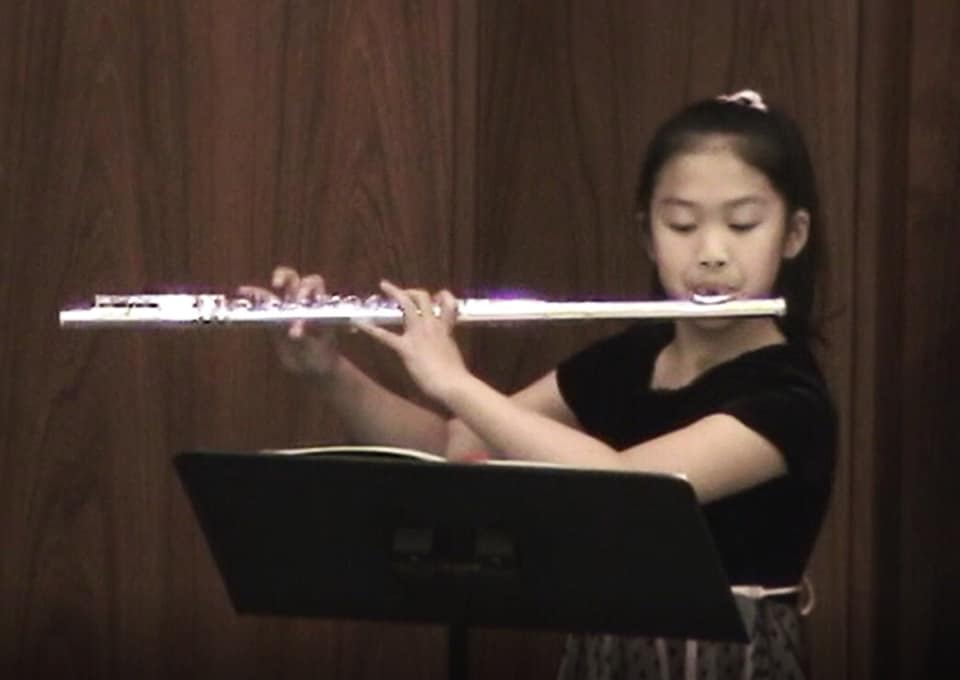
Annie’s first public flute performance recital, aged 8 or 9.
Annie Wu performs Flute Concerto by Kevin Puts, California Symphony Composer-in-Residence alum (1996-1999), paired with Mozart’s first symphony and Haydn’s last symphony at the California Symphony’s MOZART AND HIS MENTOR November 16th and 17th at the Lesher Center for the Arts in Walnut Creek. Tickets are $42-$72 ($20 for students 25 and under), available online or through the Lesher Center Box Office at 925.934.7469.

